- Home
- Medical news & Guidelines
- Anesthesiology
- Cardiology and CTVS
- Critical Care
- Dentistry
- Dermatology
- Diabetes and Endocrinology
- ENT
- Gastroenterology
- Medicine
- Nephrology
- Neurology
- Obstretics-Gynaecology
- Oncology
- Ophthalmology
- Orthopaedics
- Pediatrics-Neonatology
- Psychiatry
- Pulmonology
- Radiology
- Surgery
- Urology
- Laboratory Medicine
- Diet
- Nursing
- Paramedical
- Physiotherapy
- Health news
- Fact Check
- Bone Health Fact Check
- Brain Health Fact Check
- Cancer Related Fact Check
- Child Care Fact Check
- Dental and oral health fact check
- Diabetes and metabolic health fact check
- Diet and Nutrition Fact Check
- Eye and ENT Care Fact Check
- Fitness fact check
- Gut health fact check
- Heart health fact check
- Kidney health fact check
- Medical education fact check
- Men's health fact check
- Respiratory fact check
- Skin and hair care fact check
- Vaccine and Immunization fact check
- Women's health fact check
- AYUSH
- State News
- Andaman and Nicobar Islands
- Andhra Pradesh
- Arunachal Pradesh
- Assam
- Bihar
- Chandigarh
- Chattisgarh
- Dadra and Nagar Haveli
- Daman and Diu
- Delhi
- Goa
- Gujarat
- Haryana
- Himachal Pradesh
- Jammu & Kashmir
- Jharkhand
- Karnataka
- Kerala
- Ladakh
- Lakshadweep
- Madhya Pradesh
- Maharashtra
- Manipur
- Meghalaya
- Mizoram
- Nagaland
- Odisha
- Puducherry
- Punjab
- Rajasthan
- Sikkim
- Tamil Nadu
- Telangana
- Tripura
- Uttar Pradesh
- Uttrakhand
- West Bengal
- Medical Education
- Industry
Researchers do not support routine use of tension-free mesh closure in hiatal hernia repair for GERD

Sweden: Findings from a 13-year follow-up of a randomized clinical trial (RCT) suggest against the routine use of tension-free mesh closure in laparoscopic hiatal hernia repair for gastroesophageal reflux disease (GERD). The findings were published online in JAMA Surgery on October 11, 2023.
In the follow-up of an RCT of 159 patients with chronic GERD randomly assigned to the intervention group, follow-up data was obtained from 103. The researchers revealed a non-significant difference between recurrence rates of radiologically verified hiatal hernia at 13 years (38% for mesh and 31% for sutures alone), with long-term obstructive reports more common for mesh.
Antireflux surgery is reported to be an effective treatment of GERD, but the durability of concomitant hiatal hernia repair remains challenging. Previous studies showed that the use of a mesh-reinforced, tension-free technique was tied to more dysphagia for solid foods after three years without reducing recurrence rates of hiatal hernia compared with crural sutures alone, but the long-term effects of this technique have not been evaluated.
To fill this knowledge gap, Apostolos Analatos, Karolinska Institutet, Stockholm, Sweden, and colleagues aimed to evaluate the long-term functional and anatomical outcomes of using a mesh for hiatal hernia repair in GERD patients.
The double-blind RCT was performed at a single centre in Sweden from 2006 to 2010. One hundred fifty-nine patients were recruited and randomly assigned. Data for the analysis were collected from 2021 to 2022. All analyses were conducted with the intention-to-treat population.
Closure of the diaphragmatic hiatus was determined with crural sutures alone versus a tension-free technique using a nonabsorbable polytetrafluoroethylene mesh (Bard CruraSoft).
The primary outcome was radiologically verified recurrent hiatal hernia after more than 10 years. Secondary outcomes were dysphagia scores (varied from 1 to 4, with 1 indicating no episodes of dysphagia and 4 indicating more than 3 episodes of dysphagia per day) for liquid and solid foods, proton pump inhibitor consumption, generic 36-Item Short Form Health Survey and disease-specific Gastrointestinal Symptom Rating Scale symptom assessment scores, and reoperation rates.
Based on the study, the researchers reported the following findings:
- Of 145 available patients, follow-up data were obtained from 103 (response rate 71%; mean age at follow-up, 65 years; 55 [53%] female), with 53 initially randomly assigned to mesh reinforcement, and 50 to crural suture alone. The mean follow-up time was 13 years.
- The verified radiologic hiatal hernia recurrence rates were 11 of 29 (38%) in the mesh group vs 11 of 35 (31%) in the suture group.
- 13 years postoperatively, mean dysphagia scores for solids remained significantly higher in the mesh group (mean, 1.9 versus 1.6).
"Tension-free crural repair with nonabsorbable mesh does not lower the 13 years postoperative incidence of hiatal hernia recurrence 13 years postoperatively," the researchers wrote.
They added, "This finding combined with maintained higher dysphagia scores does not support the routine use of tension-free polytetrafluoroethylene mesh closure in laparoscopic hiatal hernia repair for treatment of GERD."
Reference:
Analatos A, Håkanson BS, Ansorge C, Lindblad M, Lundell L, Thorell A. Hiatal Hernia Repair With Tension-Free Mesh or Crural Sutures Alone in Antireflux Surgery: A 13-Year Follow-Up of a Randomized Clinical Trial. JAMA Surg. 2024;159(1):11–18. doi:10.1001/jamasurg.2023.4976
Dr Kamal Kant Kohli-MBBS, DTCD- a chest specialist with more than 30 years of practice and a flair for writing clinical articles, Dr Kamal Kant Kohli joined Medical Dialogues as a Chief Editor of Medical News. Besides writing articles, as an editor, he proofreads and verifies all the medical content published on Medical Dialogues including those coming from journals, studies,medical conferences,guidelines etc. Email: drkohli@medicaldialogues.in. Contact no. 011-43720751


